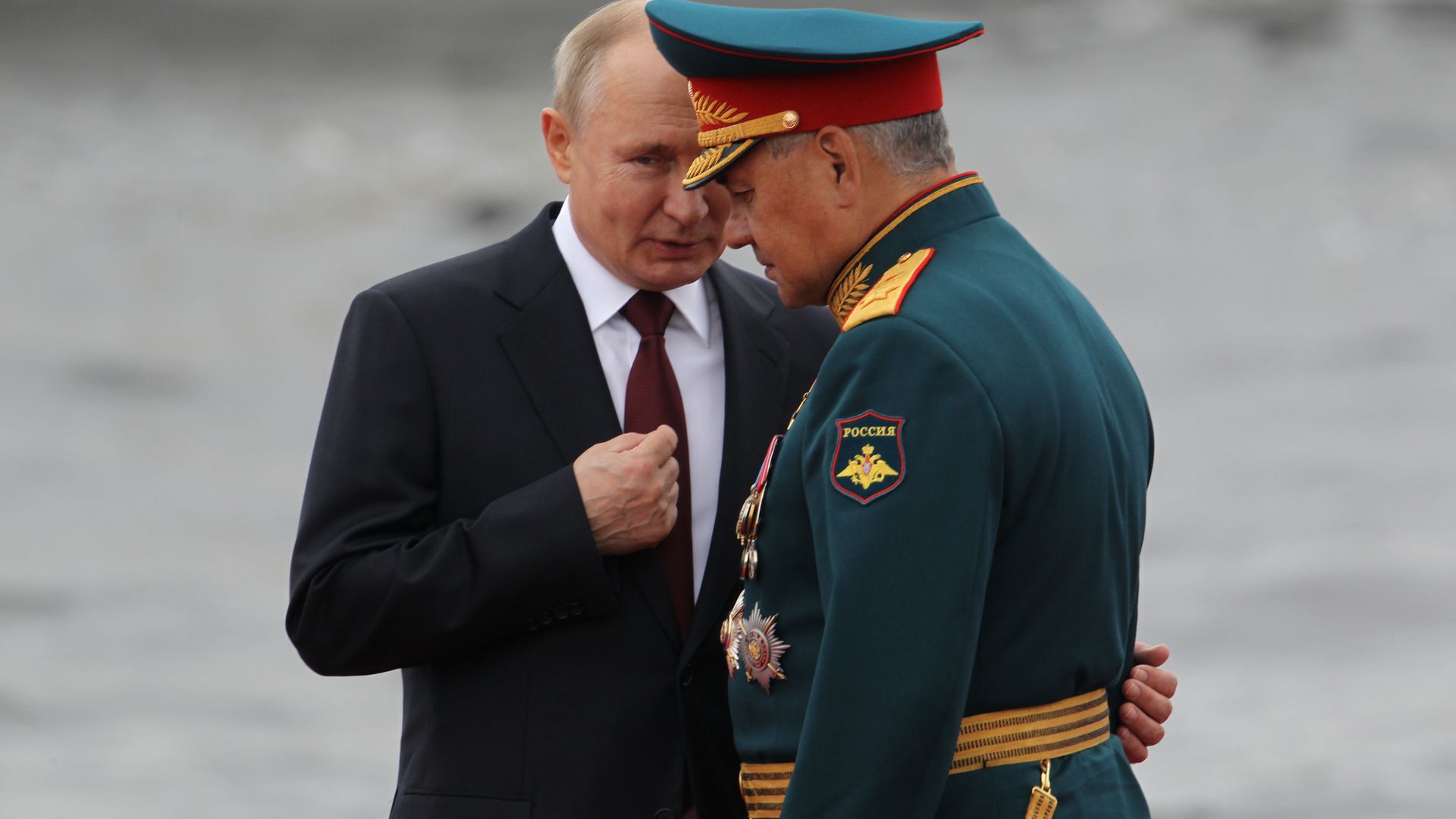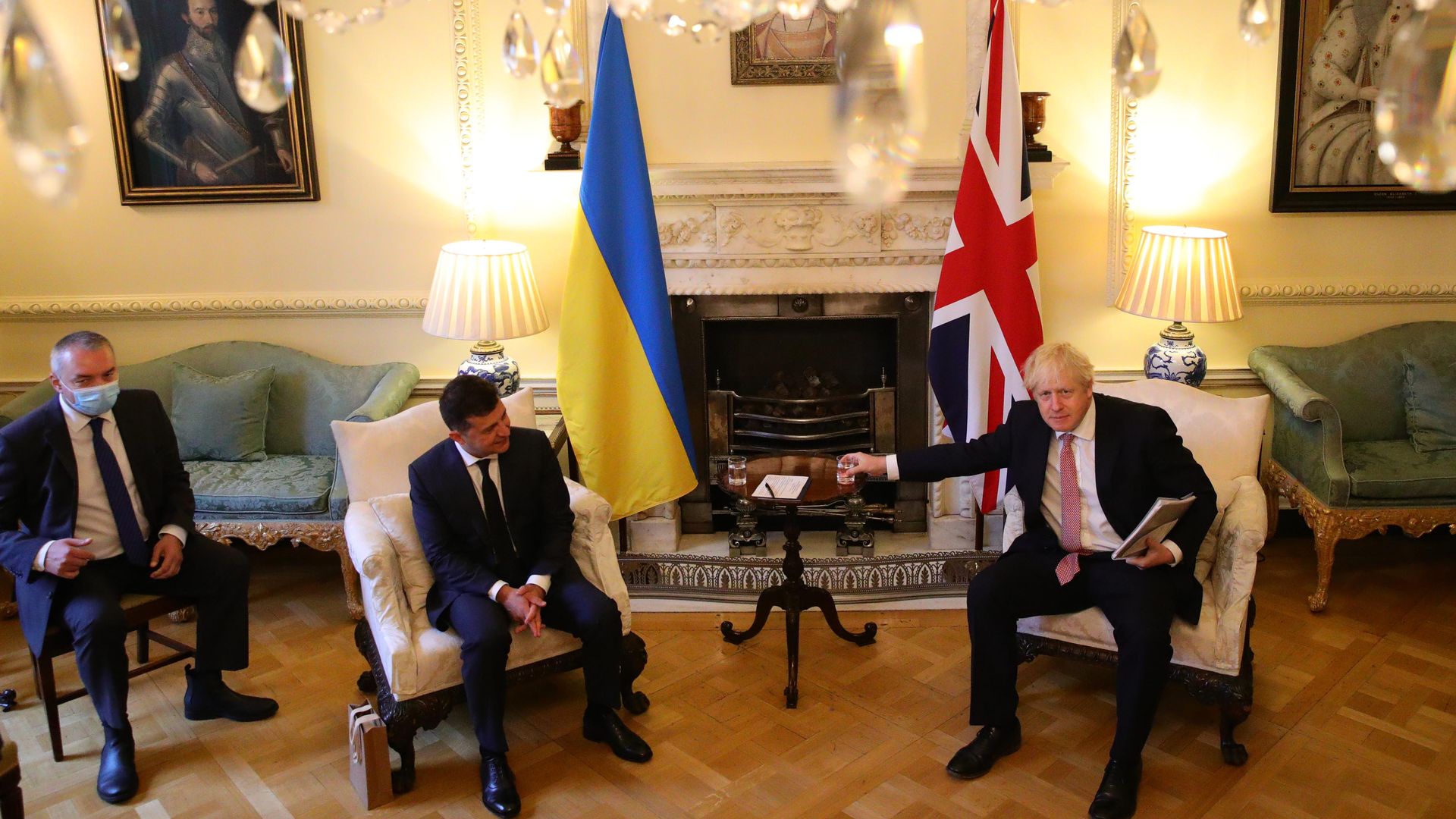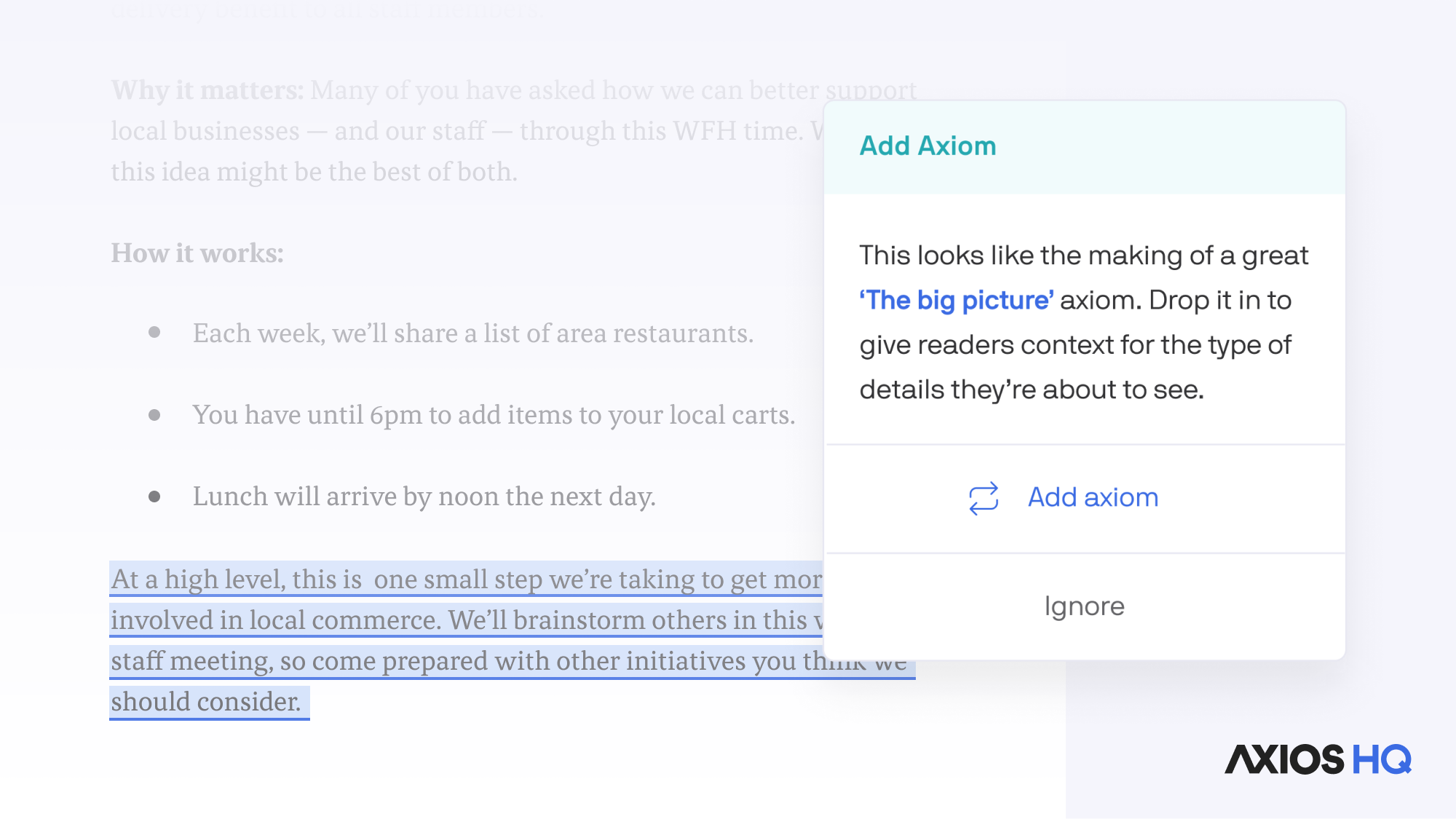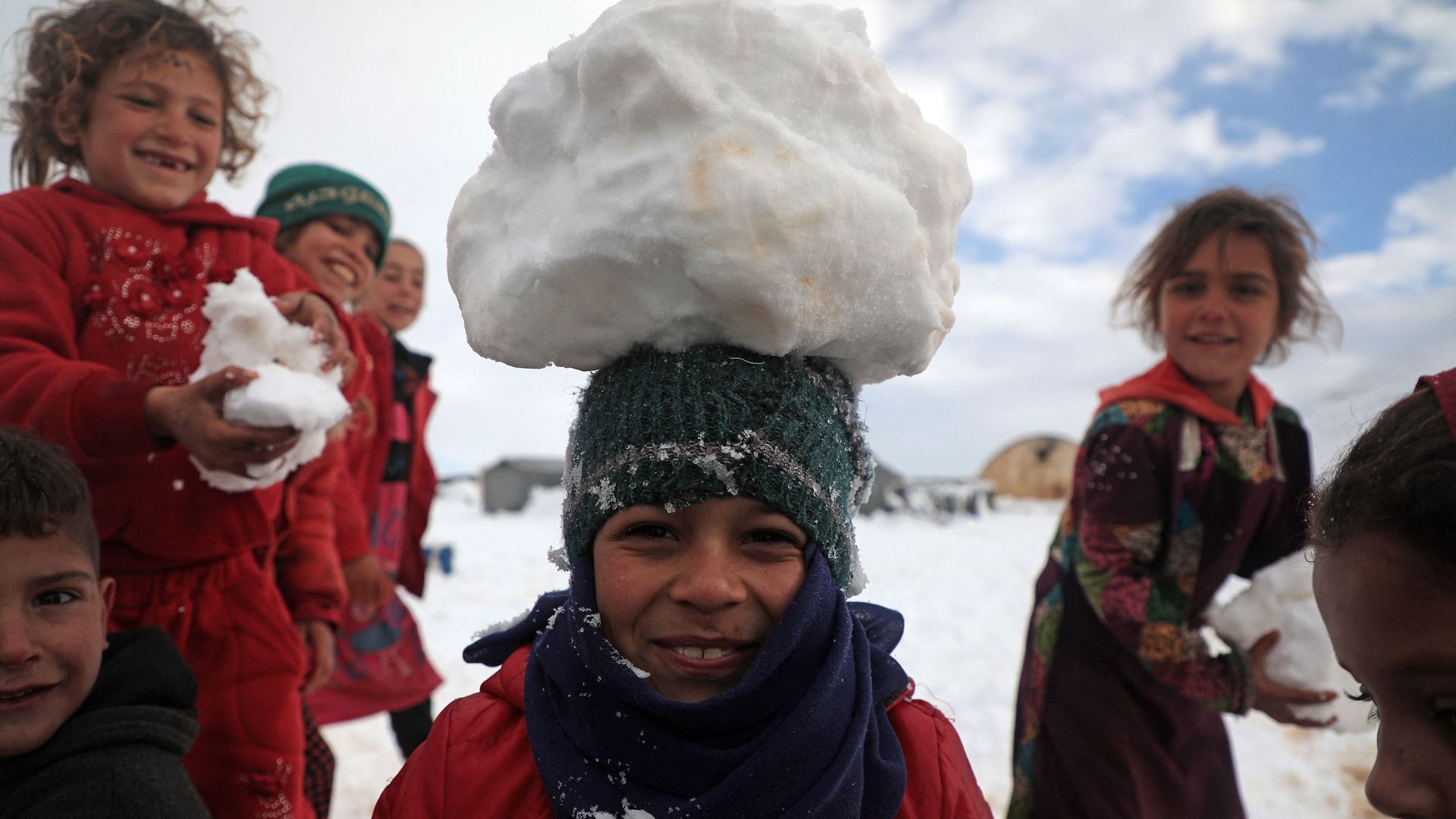| | | | | | | | | | | Axios World | | By Dave Lawler ·Jan 20, 2022 | | Welcome back to Axios World. - We begin tonight's edition (1,865 words, 7 minutes) with the story that has dominated headlines the week here in Washington: Ukraine.
New arrival? Subscribe. | | | | | | 1 big thing: Putin keeps his options open |  | | | Putin confers with Defense Minister Sergei Shoigu. Photo: Mikhail Svetlov/Getty | | | | The Biden administration is framing Russian escalation in Ukraine as almost a foregone conclusion, but the Russians are still at the table and Vladimir Putin may be seeking concessions from the West rather than a military confrontation with Ukraine. Driving the news: Secretary of State Tony Blinken, who will meet his Russian counterpart Sergey Lavrov tomorrow in Geneva, contended in a speech today from Berlin that Putin's intentions are clear: "He's laying the groundwork for an invasion because he doesn't believe Ukraine is a sovereign nation." - That followed President Biden's remark on Wednesday that Putin likely hadn't made up his mind, but "my guess is he will move in."
- The administration has said Russia is actively manufacturing a pretext for invasion and warned that Putin could use joint military exercises in Belarus as cover to invade from the north.
State of play: Many analysts remain skeptical that Putin will order a full-scale invasion, at least without a significant reinforcement of the around 100,000 troops massed near the border. - There's no question that Russia's military is vastly more powerful than Ukraine's, but attempting to invade and occupy a well-armed, hostile country would likely entail military casualties on a scale Europe hasn't seen in decades.
- Short of that, Putin could seek to occupy and annex separatist-controlled portions of eastern Ukraine, or seize coastal areas to create a land bridge between Russia and occupied Crimea.
- Biden also noted today that Russia could reprise its "gray zone" tactics from 2014 — deploying paramilitaries or "Russian soldiers not wearing Russian uniforms."
The other side: The secretary of Ukraine's Security Council told the WSJ today that, at least in the short term, he expects Russia to seek to destabilize Kyiv through nonmilitary means like cyberattacks, economic pressure and disinformation. - President Volodymyr Zelensky also said this week that the threat of invasion is no higher than in previous years, likely in part to reassure Ukrainian citizens.
- Still, Ukrainian officials were alarmed by Biden's suggestion (since walked back) that if Putin opts for a "minor incursion," NATO allies might be divided over how to respond.
- Biden inadvertently underscored the crucial question of just what it would take to trigger the "massive" economic consequences the U.S. and its European allies have promised, particularly for countries like Germany that rely on Russian gas.
The Russians continue to insist they have no intention of invading, while holding out the threat of a "military-technical response" if NATO won't meet its demands to rule out membership for Ukraine, roll back its presence in eastern Europe, and pledge not to deploy certain offensive weaponry. - Moscow is also pressing the U.S. to "strong-arm Kyiv" into implementing the Minsk protocols — the agreements signed in 2014 and 2015 that call for a ceasefire in eastern Ukraine and a special status for the separatist-controlled regions.
- Zelensky has taken a much harder line on that front than the Kremlin expected when he was elected in 2019 on a pro-peace platform.
- Blinken said Wednesday that the U.S. would be happy to engage over the Minsk process, but that Russia is not holding up its end of the agreement.
The bottom line: Pulling the U.S. into urgent talks on Ukraine and European security is already a victory of sorts for Putin, but there's no chance of an agreement on the terms he's set out. - The prospects of a swift compromise — a temporary moratorium on NATO membership, for example — currently appear remote.
- That leaves the crucial questions of what Putin's ultimate aims are and what it would take to satisfy or deter him.
|     | | | | | | 2. Breaking it down: Who's arming the Ukrainians |  | | | U.K. Prime Minister Boris Johnson (right) meets with Ukrainian President Volodymyr Zelensky. Photo: Aaron Chown/WPA Pool/Getty | | | | The State Department has approved requests from Estonia, Latvia and Lithuania to transfer U.S.-made weaponry to Ukraine, reflecting a growing urgency on NATO's eastern periphery to deter Russian aggression, Axios' Zach Basu reports. The big picture: The U.S. has provided over $400 million in security assistance to Ukraine over the past year, more than at any point since 2014, when the Russians steamrolled their way into Crimea. Biden also authorized an additional $200 million in December. - The Ukrainian government and both Republicans and Democrats in Congress are pushing for up to $500 million more. A bill introduced today would initiate a "lend-lease" agreement for Ukraine.
The U.K. has airlifted over 2,000 anti-tank missile launchers to Ukraine this week alone (check out this stunning time-lapse), and it's dispatched an elite special operations group to train Ukrainian ground forces. - The Baltic states will send Javelin anti-tank missiles and Stinger air-defense missiles, according to Reuters. Denmark also announced a new $25 million "comprehensive support" package.
- Turkey agreed to a military cooperation framework with Ukraine last fall, and it infuriated Russia by selling Kyiv a batch of drones that were deployed in the Donbas.
- Canada has sent a special operations unit for training and has not ruled out sending defensive weapons.
- The Czech Republic's newly elected government says it's open to supplying arms to Ukraine in coordination with other countries.
The other side: Germany has declined to send arms to Ukraine due to a new ban on such exports to conflict zones. - Foreign Minister Annalena Baerbock said in a visit to Kyiv this week that the policy was "rooted in our history."
- Germany is the world's fourth-largest arms exporter, but the previous government also opposed sending lethal weaponry to Ukraine to avoid provoking Russia.
|     | | | | | | 3. State of the outbreak |  Data: Our World in Data; Chart: Baidi Wang/Axios 1. A welcome trend is playing out across places that were hit early by big Omicron waves — from South Africa to the U.K. to the northeastern U.S. and now to major cities in India: Huge spikes in cases have been followed by rapid declines. - What to watch: While the end of the Omicron wave is in sight in the U.S., hospitalizations and deaths lag behind cases, so it could still be a rough few weeks, Axios Vitals author Tina Reed reports.
2. There's no evidence that healthy children and adolescents need boosters, according to the WHO. - In related news… A fourth dose of the Pfizer vaccine makes little difference against Omicron, according to a study from Israel, despite earlier findings that a second booster significantly increased antibodies.
3. UNAIDS executive director Winnie Byanyima unleashed a withering criticism of Moderna during a Financial Times panel today that included the firm's chief legal officer. - "For a year and a half, Moderna turned its back on the African continent and COVAX" while its CEO became a billionaire, Byanyima said, adding that Pfizer and Moderna are now pretending the supply problem is fixed to protect their profits.
- "We all agree that we were slow as an industry at getting supply to the African continent," replied Shannon Klinger, the Moderna executive. But she said the supply picture is much different now and Moderna is offering doses at not-for-profit prices.
4. Hong Kong is culling hamsters and quarantining visitors to a pet store where several hamsters and one customer tested positive for the virus. |     | | | | | | A message from Axios | | A better way to communicate with stakeholders | | |  | | | | What's new: AxiosHQ is a simple writing tool — perfected by Axios writers and machine learning — that helps you write with clarity and efficiency. - It includes tips to make your internal communications more effective. For example, add an Axiom to highlight your main points.
Learn more. | | | | | | Bonus: Where in the world? | | Today's theme is former capital cities, in recognition of Indonesia moving ahead with plans to shift its capital from Jakarta to a new planned city, Nusantara. Here's how it works: I give you the country and the year the capital moved, you give me the former capital city. - Hints: In most, but not all, of these cases, the capital moved from a larger metropolis to a smaller administrative capital. In every case, the city the capital moved to remains the capital.
- U.S. (1800)
- Russia (1918)
- Australia (1927)
- China, Republic of (1949)
- Pakistan (1959)
- Brazil (1960)
- West Germany (1990)
- Nigeria (1991)
- Tanzania (1996)
- Kazakhstan (1997)
- Myanmar (2005)
|     | | | | | | 4. China builds its own movie empire |  Data: Gower Street; Chart: Kavya Beheraj/Axios China blocked all four of Disney's Marvel movies from being released in its theaters last year, a grim sign for U.S. film giants being squeezed out of the world's fastest-growing box office, Axios' Sara Fischer and Bethany Allen-Ebrahimian report. Why it matters: The Chinese Communist Party is using domestic films as a key conduit for mass messaging, leaving little room for foreign views. The pandemic provided an opportunity to tighten control. - Revenue for U.S. films in China fell across the board, while Chinese films dominated the box office.
Go deeper. |     | | | | | | 5. Guess who's back? |  | | | Silvio Berlusconi. Photo: Antonio Masiello/Getty | | | | 1. Nursultan Nazarbayev is back in the public eye, though it's unclear what the future holds for Kazakhstan's ex-dictator after President Kassym-Jomart Tokayev removed him as head of the security council and purged his allies. - In a televised speech on Tuesday, Nazarbayev denied reports that he fled the country, referred to himself as a "pensioner" and offered Tokayev his full support.
- What to watch: The Nazarbayev family controls much of the Kazakh economy, so there could still be a major power struggle to come.
2. Twitter is back in Nigeria, but the company made several concessions to end a seven-month ban that began after the platform removed a post by President Muhammadu Buhari for threatening violence. - Why it matters: Big markets like Nigeria and India are trying to keep social media companies on a tighter leash.
- Flashback: Twitter was a key rallying point for the 2020 #EndSARS protests against police brutality that rocked Buhari's administration.
3. Silvio Berlusconi wants to be back in high office in Italy at age 85. - Italian lawmakers will gather beginning on Monday to select the next president in a format that resembles a papal conclave. The largely ceremonial but constitutionally significant role has a seven-year term
- What to watch: Berlusconi clearly wants the job, but the front-runner appears to be Prime Minister Mario Draghi. If Draghi takes the post, the government could collapse.
|     | | | | | | 6. What I'm reading: The movie star mercenaries who don't exist |  | | | A statue of Russian mercenaries inaugurated last November in Bangui. Photo: Barbara Debout/AFP via Getty | | | | The biggest film ever produced in the Central African Republic glorifies the supposed heroics of Russian mercenaries... who the government denies are in the country. The big picture: The Wagner Group has become a secretive agent of Russian influence in unstable countries like the CAR, though the Kremlin denies any links to Wagner. So does oligarch Yevgeny Prigozhin, who is believed to finance the group. He also bankrolled the movie. "Last May, the film's Russian producers held a massive premiere at the national stadium in Bangui, attended by government ministers, 10,000 viewers, a representative of the Russian culture ministry and a number of men linked to Wagner," the FT's Neil Munshi reports in one of the most topsy-turvy stories I can recall reading. - "There is a Voldemort quality to the Russian presence in the capital. They're spoken of in hushed tones, particularly among humanitarians and diplomats, who drop their voices on the word — Russians — as though it might be cursed. At the same time, the mercenaries are everywhere I go in the city, recognisable by their flagless camo uniforms and the masks that hide the bottom half of their faces."
- Munshi visits the stadium that hosted the premiere and finds "peeling stickers that read 'With the Support of Evgeny Prigozhin' in Sango above a heart-shaped Russian flag."
Dive in. |     | | | | | | 7. Stories we're watching |  | | | Playing with snow at a camp for displaced people in Aleppo, Syria. Photo: Aaref Watad/AFP via Getty | | | - Tonga eruption: satellite imagery; incredible power, aid arrives
- CIA finds Havana syndrome unlikely a foreign campaign
- China's app for Olympic athletes has security flaws
- Abu Dhabi attack fallout
- Make or break for Iran deal
- NATO's plan for space
- Netanyahu plea talks enter crunch time
Quoted: "In the name of God, go!" — Conservative MP David Davis to his erstwhile ally Boris Johnson, quoting Leo Amery to Neville Chamberlain in 1940, who was quoting Oliver Cromwell to the Rump Parliament in 1653. |     | | | | | | A message from Axios | | A better way to communicate with stakeholders | | |  | | | | What's new: AxiosHQ is a simple writing tool — perfected by Axios writers and machine learning — that helps you write with clarity and efficiency. - It includes tips to make your internal communications more effective. For example, add an Axiom to highlight your main points.
Learn more. | | | | Answers: 1. Philadelphia. 2. St. Petersburg/Petrograd. 3. Melbourne. 4. Nanjing. 5. Karachi. 6. Rio de Janeiro. 7. Bonn. 8. Lagos. 9. Dar es Salaam. 10. Almaty. 11. Yangon. Key: 1. U.S. (1800). 2. Russia (1918). 3. Australia (1927) 4. China, Republic of (1949). 5. Pakistan (1959). 6. Brazil (1960). 7. West Germany (1990). 8. Nigeria (1991). 9. Tanzania (1996). 10. Kazakhstan (1997). 11. Myanmar (2005). |  | Bring the strength of Smart Brevity® to your team — more effective communications, powered by Axios HQ. | | | | | | Axios thanks our partners for supporting our newsletters. If you're interested in advertising, learn more here.
Sponsorship has no influence on editorial content. Axios, 3100 Clarendon Blvd, Suite 1300, Arlington VA 22201 | | | You received this email because you signed up for newsletters from Axios.
Change your preferences or unsubscribe here. | | | Was this email forwarded to you?
Sign up now to get Axios in your inbox. | | | | Follow Axios on social media:    | | | | | |
Post a Comment
0Comments